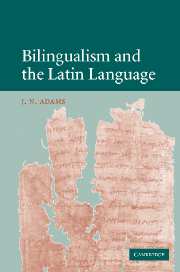Book contents
- Frontmatter
- Contents
- Preface
- Acknowledgments
- List of abbreviations
- 1 INTRODUCTION
- 2 LANGUAGES IN CONTACT WITH LATIN
- 3 CODE-SWITCHING
- 4 BILINGUALISM, LINGUISTIC DIVERSITY AND LANGUAGE CHANGE
- 5 LATIN IN EGYPT
- 6 BILINGUALISM AT DELOS
- 7 BILINGUALISM AT LA GRAUFESENQUE
- 8 THE LATIN OF A LEARNER (P. AMH. II.26): A CASE STUDY
- 9 SOME CONCLUDING REMARKS
- Bibliography
- Indexes
5 - LATIN IN EGYPT
Published online by Cambridge University Press: 03 December 2009
- Frontmatter
- Contents
- Preface
- Acknowledgments
- List of abbreviations
- 1 INTRODUCTION
- 2 LANGUAGES IN CONTACT WITH LATIN
- 3 CODE-SWITCHING
- 4 BILINGUALISM, LINGUISTIC DIVERSITY AND LANGUAGE CHANGE
- 5 LATIN IN EGYPT
- 6 BILINGUALISM AT DELOS
- 7 BILINGUALISM AT LA GRAUFESENQUE
- 8 THE LATIN OF A LEARNER (P. AMH. II.26): A CASE STUDY
- 9 SOME CONCLUDING REMARKS
- Bibliography
- Indexes
Summary
INTRODUCTION
Latin had only a marginal place in Egypt; it has been estimated that only about I per cent of documents from the Roman period that have survived are in Latin, proportionate to those in Greek. Even in military finds only about 10 per cent of texts are in Latin. Bagnall (1986:5) notes that included in the 76 publication numbers of the texts from Quseiral-Qadim (military documents of early Imperial date from the Red Sea coast, eight km north of the modern town of Quseir) there are three Latin papyri (18–20), three Latin ostraca (44–6) and perhaps one Latin inscription (66). He observes: ‘Latin thus makes up about ten percent of the corpus of Greek and Latin texts. The same ratio is found in the Florida ostraka, and no doubt in both cases we have at least a general reflection of the limited but real role of Latin in the administration of the Roman army in Egypt.’ To talk of the Latin of Egypt would be misleading, because it might imply that there was an established Latin-speaking population such as might have developed over the generations its own regional features in that language. In fact the Latin which has turned up in Egypt represents a considerable diversity. If a Latin text is discovered in Egypt, that does not mean that its author was of Egyptian origin.
- Type
- Chapter
- Information
- Bilingualism and the Latin Language , pp. 527 - 641Publisher: Cambridge University PressPrint publication year: 2003
- 1
- Cited by



